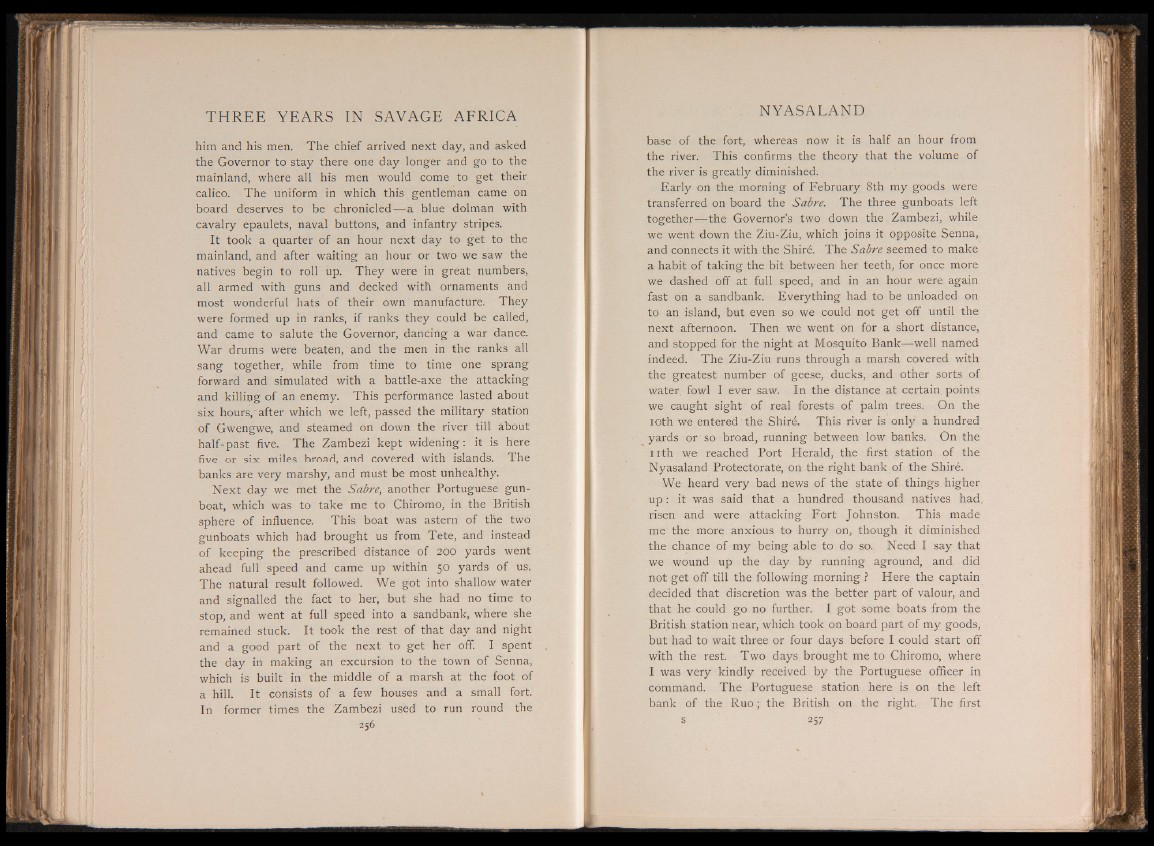
him and his men. The chief arrived next day, and asked
the Governor to stay there one day longer and go to the
mainland, where all his men would come to get their
calico. The uniform in which this gentleman came on
board deserves to be chronicled—a blue dolman with
cavalry epaulets, naval buttons, and infantry stripes.
It took a quarter of an hour next day to get to the
mainland, and after waiting an hour or two we saw the
natives begin to roll up. They were in great numbers,
all armed "with guns and decked with ornaments and
most wonderful hats of their own manufacture. They
were formed up in ranks, if ranks they could be called,
and came to salute the Governor, dancing a war dance.
War drums were beaten, and the men in the ranks all
sang together, while from time to time one sprang
forward and simulated with a battle-axe the attacking
and killing of an enemy. This performance lasted about
six hours,'after which we left, passed the military station
of Gwengwe, and steamed on down the river till about
half-past five. The Zambezi kept widening: it is here
five or six miles broad, and covered with islands. The
banks are very marshy, and must be most unhealthy.
Next day we met the Sabre, another Portuguese gunboat,
which was to take me to Chiromo, in the British
sphere of influence. This boat was astern of the two
gunboats which had brought us from Tete, and instead
of keeping the prescribed distance of 200 yards went
ahead full speed and came up within 50 yards of us.
The natural result followed. We got into shallow water
and signalled the fact to her, but she had no time to
stop, and went at full speed into a sandbank, where she
remained stuck. It took the rest of that day and night
and a good part of the next to get her off. I spent
the day in making an excursion to the town of Senna,
which is built in the middle of a marsh at the foot of
a hill. It consists of a few houses and a small fort.
In former times the Zambezi used to run round the
256
base of the fort, whereas now it is half an hour from
the river. This confirms the theory that the volume of
the river is greatly diminished.
Early on the morning of February 8th my goods were
transferred on board the Sabre. The three gunboats left
together—the Governor’s two down the Zambezi, while
we went down the Ziu-Ziu, which joins it opposite Senna,
and connects it with the Shir6. The Sabre seemed to make
a habit of taking the bit between her teeth, for once more
we dashed off at full speed, and in an hour were again
fast on a sandbank. Everything had to be unloaded on
to an island, but even so we could not get off until the
next afternoon. Then we went on for a short distance,
and stopped for the night at Mosquito Bank—well named
indeed. The Ziu-Ziu runs through a marsh covered with
the greatest number of geese, ducks, and other sorts of
water, fowl I ever saw. In the distance at certain points
we caught sight of real forests of palm trees. On the
10th we entered the Shire. This river is only a hundred
yards or so broad, running between low banks. On the
nth we reached Port Herald, the first station of the
Nyasaland Protectorate, on the right bank of the Shire.
We heard very bad news of the state of things higher
up: it was said that a hundred thousand natives had,
risen and were attacking Fort Johnston. This made
me the more anxious to hurry on, though it diminished
the chance of my being able to do so. Need I say that
we wound up the day by running aground, and did
not get off till the following morning ? Here the captain
decided that discretion was the better part of valour, and
that he could go no further. I got some boats from the
British station near, which took on board part of my goods,
but had to wait three or four days before I could start off
with the rest. Two days brought me to Chiromo, where
I was very kindly received by the Portuguese officer in
command. The Portuguese station here is on the left
bank of the Ruo; the British on the right. The first
s 257